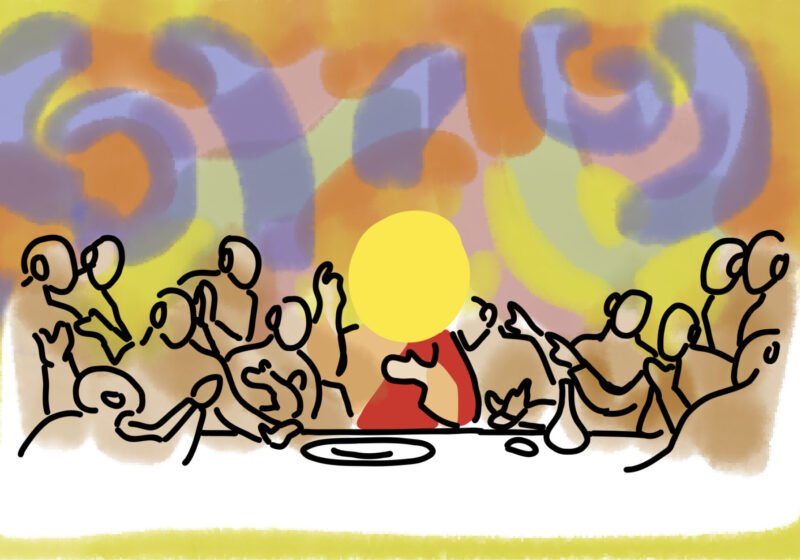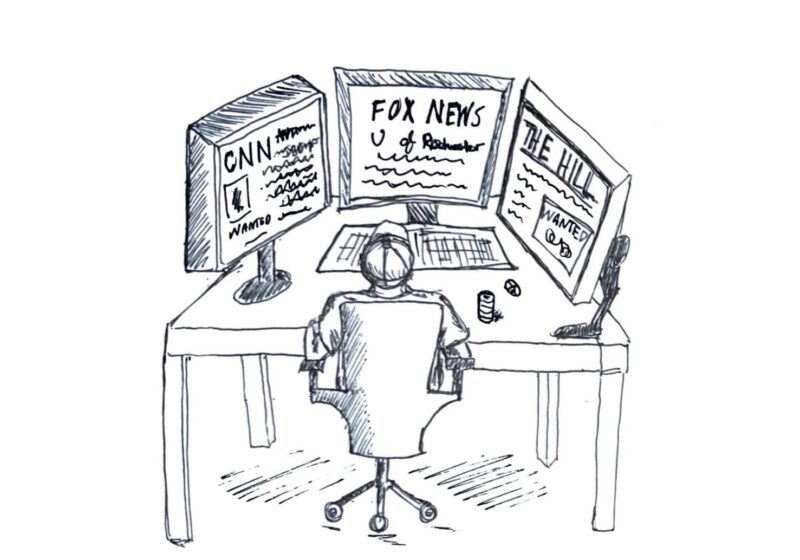I was introduced to “nothing, except everything.” as I am introduced to a lot of things: through mindless social media scrolling. I was swiping through the Instagram stories on my feed when one from one of my high school classmates caught my eye. “It’s finally out!” it said. “So glad to have been a part of this.”
Attached was a trailer for a short film called “nothing, except everything.” which was posted on YouTube on Sept. 29. Turns out that my classmate was an extra for the project. Curious, I clicked the link. What started as a mild interest in seeing my classmate’s face soon turned into a 12-minute journey as I was drawn into the world of “nothing, except everything.”
The film begins with a quote by Karl Marx (“I am nothing but I must be everything”) appearing on the black screen. After, we cut to a shot of high schoolers in a bustling cafeteria. We zoom in, until all of a sudden, everything freezes. Everything except our protagonist, Miles, played by David Mazouz.
“Quick,” he tells us. “Think of a number one to 10.”
Turns out that one out of three people choose the number seven, which Miles is desperate to find the meaning behind. However, soon after a quick montage of Miles interviewing students about their choice of one through 10 and some Everything-Everywhere-All-at-Once-esque shots of Miles glitching through phases of his life in his attempt to find reason behind this number seven — but the whole sentiment is quickly forgotten as we move on to the rest of the film.
There isn’t really a plot; instead, we catch glimpses of Miles’ life as an almost-high-school-graduate. He has things that keep him going, like his one-through-10 fixation, as well as a girl named Harper. But his path is also filled with uncertainty, from where he’s going to college and his relationship with Harper to deeper thoughts of death and social unrest. Like many of us, Miles feels lost in the world. He’s afraid of what’s going to happen next and what will happen with the memories he has now as he moves through life.
“It’s a weird feeling,” Miles says to Harper as they lay next to each other near the end of the film. “It’s a kind of fleeting feeling we’ll only really experience once. Like we’re not gonna realize how good we had it until we’re old and inevitably lose contact with each other, and then, remembering all of this will be painful.”
By the end of the film, though, Miles learns to embrace this uncertainty instead of pushing it away. As he sits in his empty college dorm room, he reminisces about his childhood years, and about Harper, but he’s ready to move on.
When I first watched this film, I knew that it had to have been made by someone like me: a young student who recently had to make that frightening transition from child to adult. And it turns out that the director, Wesley Wang, is just that: as a current first-year at Harvard, he made “nothing, except everything.” during his last year of high school.
Having just finished my last year of high school this past June, I couldn’t help but be filled with nostalgia when seeing the various shots of Miles’ memories interspersed throughout the film, from childhood scenes of him riding a bike and ice skating to moments from high school, fun memories and awkward conversations alike.
Like Miles, I feel like I am constantly trying to grasp at these memories and relationships, afraid that they’re going to fade the longer that I am in this new place. However, through his raw and realistic storytelling, Wang reminds me that I am not alone.
It’s a shame that this film only has 12 minutes to tell all of this. I would have liked more exploration into the different aspects of the film, for example Miles’ relationship with Harper and his relationship with his uncle Fred, who we only learn died by suicide in passing, but seems to play a big role in Miles’ character. Even the point of Miles’ obsession with the number seven is kind of lost as you move throughout the film.
The multiple themes in the plot are constantly fighting for the spotlight — but even with that, the notion of a plot is often replaced by aesthetic montages.
However, the occasional interruption of aesthetics in favor of something more emotionally driven — for example, scenes of Miles confronting his self-proclaimed “pretentious, nihilistic, and edgy attempt at self-awareness for the sake of self-awareness” feel grounding.
In the end, Wang tells you what you should take away from his film by showing a montage of Miles asking his classmates what they think the meaning of life is. What they tell us is similar to what we’ve all heard before: Believe in yourself and others, love everyone, and just live life.
Still, Wang’s film is a nice breath of fresh air when it comes to films that take place in a high school setting, where it seems the current genre is saturated with edgy and slang-filled attempts to relate to an audience that is so hard to imitate. Wang doesn’t try to create a life-changing movie with “nothing, except everything.” — instead, he simply tells the story as he sees it.
If you’re ever reminiscing on your high school years, this film is the nostalgia-driven tearjerker for you. It will make you remember and miss your teenage years — and at the same time, remind you of your purpose in life and the inherent beauty of the memories that shape who you are. Perhaps it will make you want to find your own number seven, your one constant in a sea of uncertainty.
The film is split up into four parts by quotes that appear on the screen. It is the last one by Marya Hornbacher that I feel encapsulates much of what Wang is trying to convey.
“There is, in the end, the letting go.”
Soon enough, we’ll all have to let go of the life we have now. But for now, “nothing, except everything.” tells us to embrace these moments and to look forward to the memories they will become in the future.





